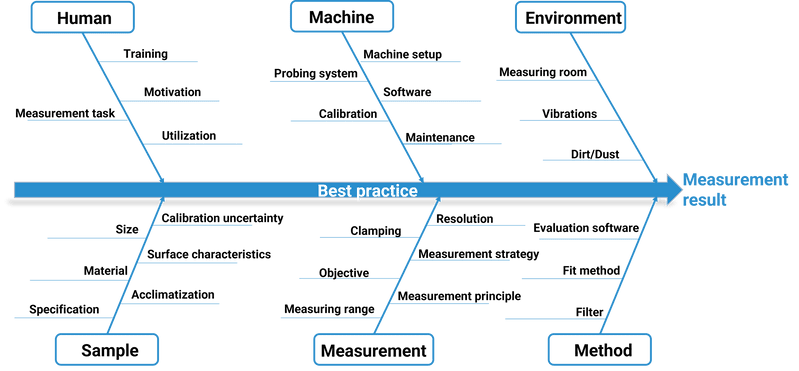Blog
L'analyse des systèmes de mesure (MSA) est un facteur essentiel dans le monde de la métrologie, car elle détermine la capacité d'un instrument à effectuer une tâche de mesure.
Dans la métrologie industrielle, une analyse du processus de mesure (MPA) ou analyse du système de mesure (MSA) est réalisée afin d’évaluer la capacité d’un système de mesure dans des conditions réelles d’utilisation.
L’objectif est de déterminer :
La MSA permet ainsi de s’assurer que l’instrument de mesure est capable de remplir sa tâche de manière adéquate et fiable.
Plusieurs méthodes peuvent être utilisées pour évaluer la capacité des équipements et des processus de mesure en conditions réelles.
Ces analyses reposent généralement sur des mesures répétées :
Ces procédures sont connues sous le nom de Gage R&R (Repeatability & Reproducibility).
Selon les normes industrielles, les exigences varient en termes de :
La capacité d’un système de mesure est généralement évaluée à l’aide des indices Cg et Cgk.
Dans de nombreuses industries, un système de mesure doit satisfaire à la condition :
Cg / Cgk > T
La valeur du facteur de tolérance T dépend :
Plus la valeur de Cgk est élevée, plus le système de mesure est performant et fiable.

T ... tolérance dans le dessin
S ... écart-type de la mesure
xg- xm.... biais de la mesure par rapport à une valeur de référence
En pratique, la performance d’un système de mesure ne dépend pas uniquement de l’instrument lui-même.
De nombreux facteurs peuvent influencer les résultats :
Ces causes sont souvent représentées à l’aide d’un diagramme d’Ishikawa (diagramme en arêtes de poisson).

While MSA and Gage R&R studies reveal whether a measurement system is capable, they do not necessarily explain how to improve measurement accuracy.
If you want to go one step further and actively optimize your measurement performance, our in-depth whitepaper provides practical guidance.
Learn how to systematically improve measurement accuracy and minimize error sources in optical metrology.
You’ll discover:
👉Download the Accuracy Whitepaper now
Improve precision. Increase repeatability. Strengthen process confidence.
Une MSA permet de déterminer si un système de mesure est capable.
Mais elle ne répond pas nécessairement à la question :
👉 Comment améliorer concrètement la précision des mesures ?
Pour aller plus loin et optimiser activement la performance de mesure, il est essentiel d’analyser en détail les facteurs d’influence et les technologies utilisées.
Notre livre blanc vous explique comment améliorer systématiquement la précision de vos mesures et réduire les sources d’erreurs.
Vous y découvrirez notamment :
Que vous soyez expert en métrologie ou débutant dans le domaine, ce guide vous fournit des stratégies concrètes pour améliorer précision, répétabilité et fiabilité des processus.
👉 Téléchargez le livre blanc dès maintenant
Améliorez la précision. Renforcez la répétabilité. Sécurisez vos processus.